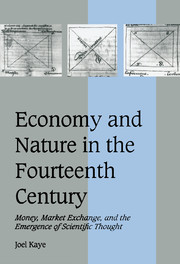 Economy and Nature in the Fourteenth Century
Economy and Nature in the Fourteenth Century Published online by Cambridge University Press: 16 July 2009
When economics and science are viewed in modern terms as separate and self-contained subjects of inquiry, it is difficult to envision how easily medieval thinkers exchanged approaches, models, and insights between these spheres. Philosophers of the thirteenth and fourteenth centuries show no hesitation in linking their economic thought (at that time considered under the larger heading of scientia moralis) with their speculations on nature. In the Aristotelian system of classification, “practical science” governing the investigation of ethical questions, including the question of justice and just exchange, utilized the same methodology as “theoretical science” governing physical thought; they differed in degree of certainty but not in approach.
The previous chapter outlined social and material developments in the thirteenth century that led to the intensification of monetary consciousness and encouraged the transference of perceptions and techniques from the economic sphere to other spheres of knowledge. From the middle of the thirteenth century this transference was encouraged from within the intellectual culture of the university as well, as the writings of Aristotle came to occupy an ever greater position within the curriculum. Given the great prestige of Aristotle within the university, his mathematical, geometrical, and markedly “scientific” treatment of economic exchange in Book v of the Nicomachean Ethics provided an influential, even authoritative, textual ground for the linking of scholastic economic thought and scientific speculation.
Aristotle's two most concentrated discussions of economic questions are found in Book i of the Politics, chapters 8–11, and Book v of the Nicomachean Ethics, chapters 3–5.
To save this book to your Kindle, first ensure [email protected] is added to your Approved Personal Document E-mail List under your Personal Document Settings on the Manage Your Content and Devices page of your Amazon account. Then enter the ‘name’ part of your Kindle email address below. Find out more about saving to your Kindle.
Note you can select to save to either the @free.kindle.com or @kindle.com variations. ‘@free.kindle.com’ emails are free but can only be saved to your device when it is connected to wi-fi. ‘@kindle.com’ emails can be delivered even when you are not connected to wi-fi, but note that service fees apply.
Find out more about the Kindle Personal Document Service.
To save content items to your account, please confirm that you agree to abide by our usage policies. If this is the first time you use this feature, you will be asked to authorise Cambridge Core to connect with your account. Find out more about saving content to Dropbox.
To save content items to your account, please confirm that you agree to abide by our usage policies. If this is the first time you use this feature, you will be asked to authorise Cambridge Core to connect with your account. Find out more about saving content to Google Drive.